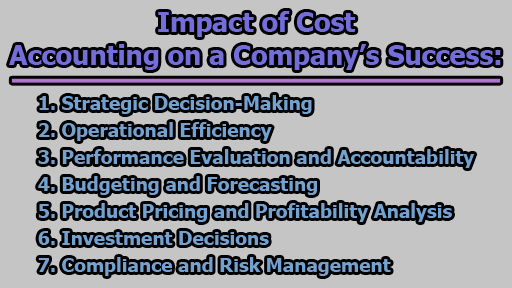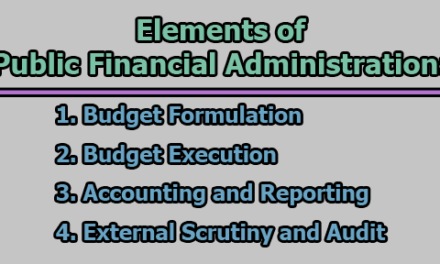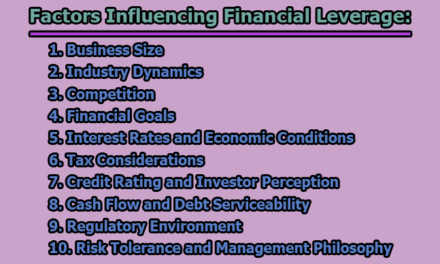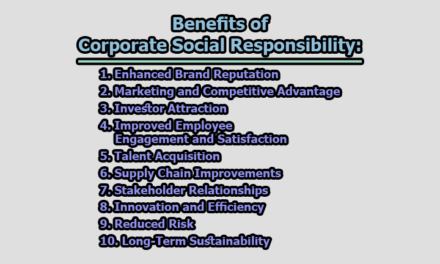Impact of Cost Accounting on a Company’s Success:
Cost accounting plays a pivotal role in the financial management of a company, serving as a critical tool for decision-making, performance evaluation, and overall strategic planning. In the dynamic and competitive business environment, where profit margins are often razor-thin, efficient cost management becomes imperative for sustainable success. In this article, we will delve into the multifaceted impact of cost accounting on a company’s success, exploring how it contributes to financial health, operational efficiency, and strategic decision-making.
1. Strategic Decision-Making: Strategic decision-making is a fundamental aspect of steering a company towards long-term success. Cost accounting equips decision-makers with the necessary financial data to make informed choices that align with the company’s goals and objectives. Through meticulous analysis of costs associated with different business activities, managers gain insights into the profitability of products or services, enabling them to make strategic decisions regarding pricing, production methods, and resource allocation.
For instance, cost accounting allows managers to identify the most cost-effective production methods by breaking down the expenses involved in each process. This insight aids in optimizing production processes, reducing wastage, and ultimately enhancing the company’s bottom line. Furthermore, when it comes to pricing strategies, cost accounting enables a comprehensive understanding of the various costs incurred in bringing a product or service to market. This knowledge is crucial for setting competitive yet profitable prices, striking a balance that ensures the company remains viable in the marketplace.
Additionally, cost accounting assists in evaluating the financial impact of potential strategic moves, such as entering new markets or diversifying product lines. By quantifying the costs associated with these initiatives, decision-makers can assess the feasibility and potential returns on investment, thus minimizing risks and maximizing opportunities for success.
2. Operational Efficiency: Operational efficiency is a key determinant of a company’s success, and cost accounting plays a pivotal role in achieving and maintaining efficiency. By dissecting and analyzing both direct and indirect costs, companies can identify areas of inefficiency and implement measures to streamline processes, reduce costs, and enhance overall operational effectiveness.
For example, cost accounting allows for a granular examination of production costs, enabling managers to identify bottlenecks or redundancies in the production process. This insight empowers companies to optimize workflows, improve resource utilization, and reduce production costs without compromising product quality. As a result, the company can produce goods or deliver services more competitively, contributing to increased profitability.
Moreover, by tracking and analyzing operational costs, companies can implement cost-saving measures without sacrificing quality. This might involve renegotiating supplier contracts, implementing energy-saving initiatives, or adopting technology solutions that automate routine tasks. Such measures not only enhance operational efficiency but also contribute to the overall financial health of the organization.
3. Performance Evaluation and Accountability: Cost accounting serves as a foundation for evaluating the performance of various departments, teams, and individuals within a company. By assigning costs to specific activities, products, or services, companies can measure the efficiency and effectiveness of each unit, fostering a culture of accountability and continuous improvement.
For instance, in a manufacturing setting, cost accounting allows for the calculation of the cost per unit for each product. This information is instrumental in evaluating the performance of different product lines or even individual products. Managers can identify which products contribute the most to the company’s profitability and focus resources on their production while phasing out or improving less profitable ones.
Furthermore, cost accounting provides a transparent view of how resources are allocated across different departments. This transparency fosters accountability among employees, as it becomes clear how their efforts contribute to the overall financial health of the company. Performance metrics derived from cost accounting, such as cost per unit or cost per department, enable companies to set benchmarks and goals, facilitating a data-driven approach to performance evaluation and improvement.
4. Budgeting and Forecasting: Cost accounting plays a crucial role in the development of accurate budgets and reliable financial forecasts. Effective budgeting is essential for aligning financial resources with strategic goals and ensuring that a company can operate within its means. Cost accounting provides the necessary framework for breaking down costs across various business functions, enabling the creation of realistic budgets.
By analyzing historical cost data and projecting future expenses, companies can develop budgets that allocate resources efficiently. This process involves estimating costs associated with production, marketing, research and development, and other operational aspects. Cost accounting helps in identifying variable and fixed costs, allowing for a more nuanced understanding of the financial requirements for each business activity.
Moreover, cost accounting facilitates the establishment of benchmarks for performance evaluation. Managers can compare actual costs against budgeted costs, enabling them to identify areas of overruns or underspending. This feedback loop contributes to continuous improvement, allowing companies to refine their budgeting processes based on real-world data.
In terms of financial forecasting, cost accounting assists in anticipating future challenges and opportunities. By extrapolating historical cost trends and considering factors such as market conditions and technological advancements, companies can make more accurate predictions about future costs. This foresight is invaluable for strategic planning, risk mitigation, and adapting to changes in the business environment.
5. Product Pricing and Profitability Analysis: Determining the right pricing strategy is a critical aspect of a company’s success, and cost accounting provides the essential tools for making informed pricing decisions. By thoroughly understanding the costs associated with producing goods or delivering services, companies can set prices that not only cover costs but also ensure profitability.
Cost accounting breaks down costs into direct and indirect categories, allowing managers to calculate the true cost of each product or service. This information is vital for establishing competitive yet profitable prices in the market. Companies can avoid underpricing that leads to losses or overpricing that may drive customers away.
Additionally, cost accounting enables profitability analysis at the product or service level. By comparing the revenue generated by each offering against the associated costs, companies can identify their most lucrative products. This insight is instrumental for resource allocation, marketing strategies, and decision-making regarding product lines. Companies can focus on promoting and enhancing the profitability of their most successful offerings, contributing to overall financial success.
Furthermore, cost accounting assists in scenario analysis, helping companies assess the impact of price changes or variations in production costs on overall profitability. This information is invaluable when adapting to market dynamics, changes in raw material costs, or shifts in consumer preferences.
6. Investment Decisions: Companies frequently encounter decisions related to capital investments, such as expanding production facilities, acquiring new equipment, or entering new markets. Cost accounting provides essential information for evaluating the financial feasibility and potential returns on these investments.
Through detailed cost analysis, companies can estimate the total cost of ownership for new assets or ventures. This includes not only the upfront acquisition costs but also ongoing operating and maintenance expenses. Such a comprehensive understanding of costs is crucial for making well-informed investment decisions.
For example, when considering expanding production capacity, cost accounting helps in assessing the additional costs involved, such as increased raw material requirements, additional labor, and maintenance expenses. This analysis enables companies to evaluate whether the expected increase in revenue justifies the additional costs, aiding in decision-making regarding expansion.
Moreover, cost accounting assists in calculating key financial metrics such as return on investment (ROI) and payback period. These metrics provide insights into the potential profitability and the time it takes to recoup the initial investment. Armed with this information, companies can prioritize investments that align with their strategic objectives and contribute positively to long-term success.
7. Compliance and Risk Management: In addition to its role in decision-making and operational efficiency, cost accounting plays a significant role in ensuring compliance with regulatory requirements and effective risk management. In industries where compliance is heavily regulated, such as healthcare and finance, adherence to accounting standards is crucial for maintaining transparency and accountability.
Cost accounting provides a structured framework for tracking and reporting costs in a manner compliant with industry standards and regulatory guidelines. This is particularly important for financial reporting, where accurate and transparent accounting practices are essential for maintaining the trust of stakeholders, including investors, creditors, and regulatory bodies.
Furthermore, cost accounting aids in risk management by identifying and quantifying risks associated with various business activities. Through detailed cost analysis, companies can identify potential cost overruns, budget variances, and other financial challenges. This proactive approach allows businesses to implement risk mitigation strategies and contingency plans, minimizing the impact of unforeseen events on the company’s financial health.
For example, cost accounting can help identify supply chain vulnerabilities by assessing the costs associated with different suppliers and potential disruptions. Companies can then diversify suppliers or establish backup plans to mitigate the risk of supply chain disruptions, ensuring continuity in production and minimizing financial losses.
Additionally, cost accounting assists in monitoring and controlling costs related to compliance requirements. This includes costs associated with meeting environmental standards, health and safety regulations, and other industry-specific compliance measures. By tracking and managing these costs effectively, companies not only ensure compliance but also contribute to the sustainability and resilience of their operations.
In conclusion, the impact of cost accounting on a company’s success is profound and far-reaching. From guiding strategic decision-making to enhancing operational efficiency, cost accounting serves as a linchpin in the financial management of successful businesses. As companies navigate the complexities of the modern business landscape, the ability to accurately assess and manage costs becomes a distinguishing factor between success and failure. Adopting robust cost accounting practices not only ensures financial stability but also provides the foundation for sustainable growth and competitiveness. In essence, cost accounting is not just a financial tool; it is a strategic asset that empowers companies to thrive in an ever-evolving economic environment.

Former Student at Rajshahi University










